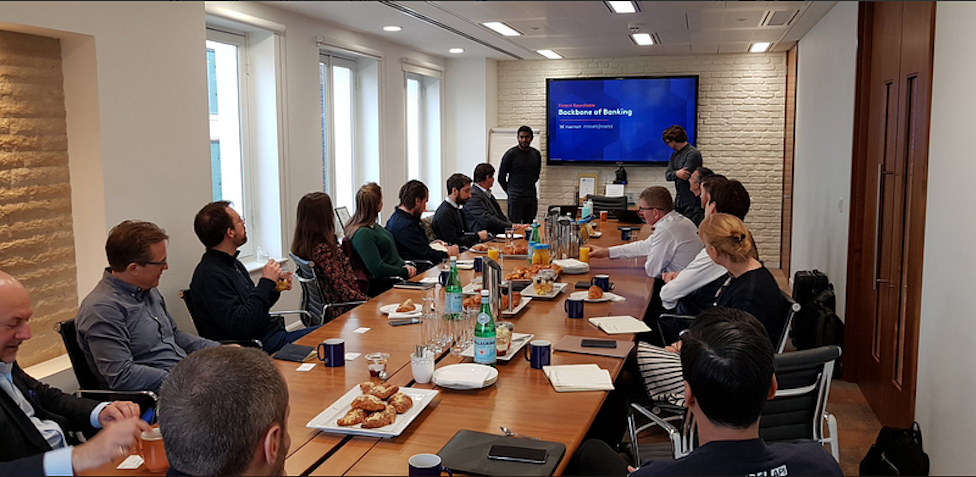Here’s what we gathered:
- Resisting the upgrade from legacy systems. While there is increased pressure on banks to fulfill customer expectations, our group shared in the difficulties convincing banks to forget outdated mainframes and breathe new life into their service.
- Lack of education. Banks are yet to reach a point where they have suitable belief and maturity in the vendors, so adoption feels comfortable. The room iterated several times the frustration that most technology leaders in banks “have no idea what we do”, finding themselves teaching the execs how their cloud solution would fit into their playbook. Banks need educating.
- Proven business and demonstrable credibility. While banks struggle to make friends with real time payments, open banking systems, moving to the cloud, and a single view of the customer, trust remains an issue. The very nature of startup is a lack of traction and trading history. Banks need reliable, robust, and mission critical systems to maintain operational bliss, and many are hesitant to dip their toe in the water.
Banks are by no means an easy customer to sell to. We wanted to share the most valuable insights harvested from the roundtable, giving you the firepower you need, to make that sale.
1. Say no to fintech tourism
While there is an element of breaking down the walls of tradition and influencing culture to create a climate of innovation, there’s no need to give away hundreds of hours of consulting to make the sale. One of the contributors puts it plainly, “As a startup, free consulting means free consulting, which means more free consulting.” There is credibility in saying, we’ll give you a bucket of our knowledge, but after a certain point, you pay.
Strike the balance between just tourism and tourism with intent. You could open doors and run sessions all day every day. Provide the product. Allow them to test it. Ask: do you want to buy?
2. Learn to navigate the organisation
Working your way across a large organisation and getting the necessary stakeholder buy-in, is still an enormously complex task. It’s not just about the technology. It’s about building the muscles within your organisation that navigate the internal workings of a bank. Look for execs who realise the need to address real-time, cloud strategies, and next gen technologies, who are hunting for solutions from top of the shop.
Clearly this doesn’t shorten the sales cycle. Don’t dismiss the fact that even though the CTO function is the main buyer, they still need the rest of the organisation’s buy-in. Compliance, risk, finance, and leadership all need to be lined up and ready to buy. Hire a sales team that can hack 9 – 18-month sales cycle and get a killer CRO on board.
3. The innovation team won’t help
It seems there is a healthy disregard for innovation teams within the fintech community. There’s a significant amount of marketing fluff associated with the department and they are set up to talk to, investigate, and inspect, but don’t necessarily have the internal traction to move the needle.
On top of that, they lack the cross organisational awareness of what needs to get done. The inclination needs to come from the top. Find the gatekeeper who is open minded enough to embrace next gen technology.
4. Think about the bank’s year end
Banks are extremely oriented towards the year end. The beginning of January is a whole new chapter. You must figure out the forcing factor, so you feed the budget and align your product with the buyer’s personal incentives.
5. Demonstrate credibility
Show the bank you are a legitimate and robust organisation. Provide proof of concept. If needed, don’t be afraid to pull out your balance sheets. Show learning against your product roadmap – prove how far you have come. Get some kick ass PR under your belt. Finally, demonstrate enough of ROI in the first 12 months to plant your flag in the ground.
Banks need reassurance that you’re going to deliver on your promises, show them your stuff.
Rest assured – we’re getting somewhere
In research conducted with financial sector execs by PwC, 73% of respondents see consumer banking as the most likely to be disrupted by fintech. But don’t set off your party poppers just yet. Over 90% of banks expect growth in the usage of mobile applications, much higher than any other financial sector. Banks have realised that if they put budget towards testing, creating real products and real solutions, their learning is much faster.
Get in there, sharpish. Regulators are beginning to accept that third party cloud infrastructure is a solid alternative to legacy mainframes. Just look at PSD2 and its impact on European banking. There is also an increasing level of reassurance from banks and regulators that this tech will meet customer demands, but also be flexible in engineering to make exciting leaps with almost guaranteed deliveries.
Don’t be fooled, this still doesn’t solve the failing expectations of customers. We are now entering a phase where there is a coalescing of infrastructure, choice, regulatory environment, and tech vendors coming to market.
Build a sales team that can help you ride that wave, confidently, with the knowledge that you are on the cusp on redefining banking for us all.






